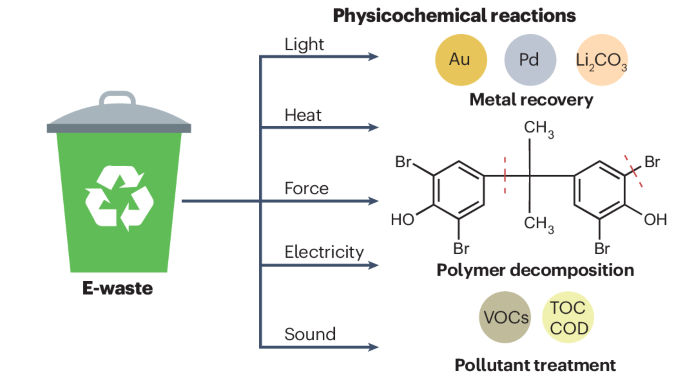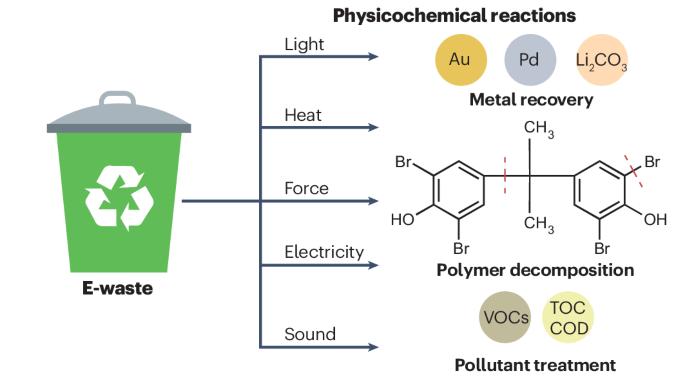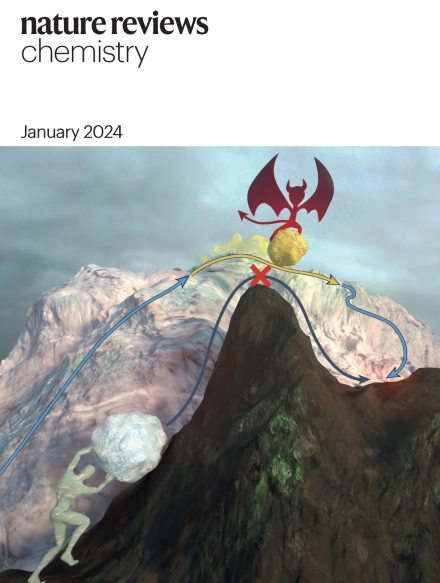电子废物回收中的物理化学反应。
IF 51.7
1区 化学
Q1 CHEMISTRY, MULTIDISCIPLINARY
引用次数: 0
摘要
电子废弃物(e-waste)的回收利用正成为全球关注的问题,这是因为电子废弃物数量巨大、具有危险性并可能造成贵重金属的损失。电子废弃物回收所涉及的许多过程都源于物理化学反应的混合物,了解这些反应的原理可以开发出更有效的回收方法。在本综述中,我们将讨论光化学、热化学、机械化学、电化学和声化学背后的原理,以便从电子垃圾中回收金属、分解聚合物和消除污染物。我们还讨论了这些过程如何根据热力学和动力学、自由基、化学键能、电势调节等诱导或改善电子废物回收的反应速率、选择性和可控性。最后,我们强调了这些物理化学反应在电子垃圾回收利用方面的关键因素、局限性和改进建议,并指出了未来可能的研究方向。本文章由计算机程序翻译,如有差异,请以英文原文为准。


Physicochemical reactions in e-waste recycling
Electronic waste (e-waste) recycling is becoming a global concern owing to its immense quantity, hazardous character and the potential loss of valuable metals. The many processes involved in e-waste recycling stem from a mixture of physicochemical reactions, and understanding the principles of these reactions can lead to more efficient recycling methods. In this Review, we discuss the principles behind photochemistry, thermochemistry, mechanochemistry, electrochemistry and sonochemistry for metal recovery, polymer decomposition and pollutant elimination from e-waste. We also discuss how these processes induce or improve reaction rates, selectivity and controllability of e-waste recycling based on thermodynamics and kinetics, free radicals, chemical bond energy, electrical potential regulation and more. Lastly, key factors, limitations and suggestions for improvements of these physicochemical reactions for e-waste recycling are highlighted, wherein we also indicate possible research directions for the future. Electronic waste (e-waste) can be recycled by physicochemical reactions. This Review discusses the principles, limitations and improvement strategies from a photo-induced, thermal-induced, force-induced, electro-induced and sonication-induced chemical reaction perspective, aiming to guide future e-waste recycling efforts towards more efficient, sustainable and economical procedures.
求助全文
通过发布文献求助,成功后即可免费获取论文全文。
去求助
来源期刊

Nature reviews. Chemistry
Chemical Engineering-General Chemical Engineering
CiteScore
52.80
自引率
0.80%
发文量
88
期刊介绍:
Nature Reviews Chemistry is an online-only journal that publishes Reviews, Perspectives, and Comments on various disciplines within chemistry. The Reviews aim to offer balanced and objective analyses of selected topics, providing clear descriptions of relevant scientific literature. The content is designed to be accessible to recent graduates in any chemistry-related discipline while also offering insights for principal investigators and industry-based research scientists. Additionally, Reviews should provide the authors' perspectives on future directions and opinions regarding the major challenges faced by researchers in the field.
 求助内容:
求助内容: 应助结果提醒方式:
应助结果提醒方式:


